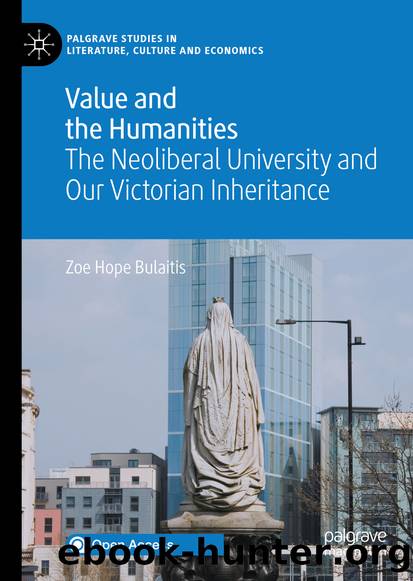Value and the Humanities by Zoe Hope Bulaitis

Author:Zoe Hope Bulaitis
Language: eng
Format: epub
ISBN: 9783030378929
Publisher: Springer International Publishing
4.3.3 Subject Matter and Style in Academic Fiction
Academic fictions are primarily focused on the lives, concerns, and interactions of academics. In Imagining the Academy, Edgerton explains that “I know that life as a professor is a privileged life in so many ways [with] work that can challenge and reward one’s creative spirit” (2005, 1). Edgerton recognises the appeal of an academic life that allows for intellectual debate and philosophical reflectiveness. Although students appear in most academic fictions, the central characters are those that Showalter calls “the lifers” (2005, 2). Whilst being a student is only ever a transitional and temporary state, the experience of being an academic is more permanent.17 In 1980, Richard Caram coined the term Professorroman , an adult counterpart to the juvenile bildungsroman, to describe a novel which follows an academic’s life.18 In the bildungsroman, a reader follows an individual’s formative years. Ensuing follies and faults are overcome, with the naivety and errors of youth being part of the necessary journey to adult responsibility. However, no such relief is permitted for the protagonist of the Professorroman who has already attained the supposed wisdom of adulthood.
John Williams’ Stoner (1965) is an illuminating example of the Professorroman. The novel tracks the life of William Stoner, from his application to study as an undergraduate at the University of Missouri to his reflections at the end of his life and career. Stoner describes his research as “a haven, an excuse to come to the office at night. He read and studied, and at last came to find some comfort, some pleasure, and even a ghost of the old joy in that which he did, a learning toward no particular end” (1965, 131). Here the reader gains an insight into the process of unending pursuit of learning that is inherent in an academic life, as opposed to an academic job. Writing for the Times Higher Education , Christopher Bigsby argues that “the value that Stoner ascribes to literature, to a precision of language, each word in its place, is that to be found in this novel, which is remarkable precisely to the degree to which it is unflinching in its observation and stunning in its humanity” (2013). Here, Bigsby raises an important point that Stoner identifies the benefit of a life spent in the humanities, not simply through its content but also through its form. The novel encapsulates a vision of slow and steady scholarship and “learning toward no particular end” (Williams 1965, 131). As Williams’ explains about his creation of Stoner: “he might not have been a very good teacher, but that didn’t matter much. He was witness to values that are important” (qtd. in Asquith 2017, 110). The novel explores the lack of fanfare surrounding the action of upholding academic integrity and a quiet solace that can be found in a life in literature.
Stoner is a novel that has only recently achieved popular acclaim and critical recognition. First published in 1965, a second edition was not published until 2003. In
Download
This site does not store any files on its server. We only index and link to content provided by other sites. Please contact the content providers to delete copyright contents if any and email us, we'll remove relevant links or contents immediately.
International Integration of the Brazilian Economy by Elias C. Grivoyannis(107247)
The Radium Girls by Kate Moore(12009)
Turbulence by E. J. Noyes(8013)
Nudge - Improving Decisions about Health, Wealth, and Happiness by Thaler Sunstein(7685)
The Black Swan by Nassim Nicholas Taleb(7095)
Rich Dad Poor Dad by Robert T. Kiyosaki(6588)
Pioneering Portfolio Management by David F. Swensen(6278)
Man-made Catastrophes and Risk Information Concealment by Dmitry Chernov & Didier Sornette(5993)
Zero to One by Peter Thiel(5778)
Secrecy World by Jake Bernstein(4735)
Millionaire: The Philanderer, Gambler, and Duelist Who Invented Modern Finance by Janet Gleeson(4456)
The Age of Surveillance Capitalism by Shoshana Zuboff(4272)
Skin in the Game by Nassim Nicholas Taleb(4229)
The Money Culture by Michael Lewis(4182)
Bullshit Jobs by David Graeber(4170)
Skin in the Game: Hidden Asymmetries in Daily Life by Nassim Nicholas Taleb(3983)
The Dhandho Investor by Mohnish Pabrai(3747)
The Wisdom of Finance by Mihir Desai(3724)
Blockchain Basics by Daniel Drescher(3571)
